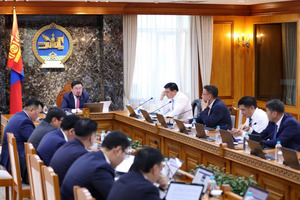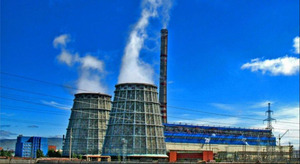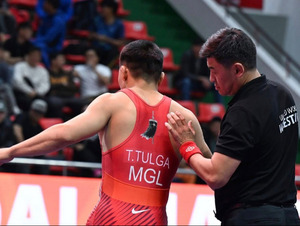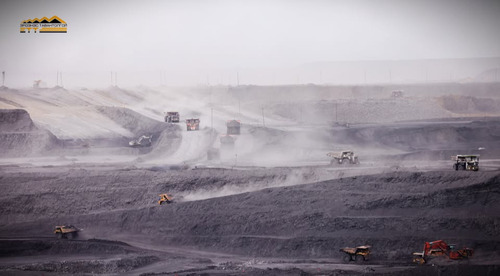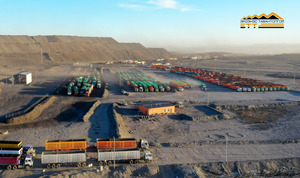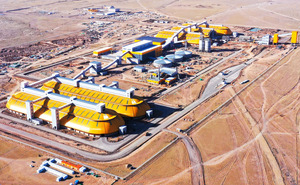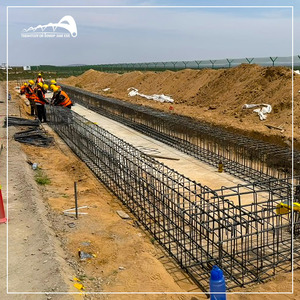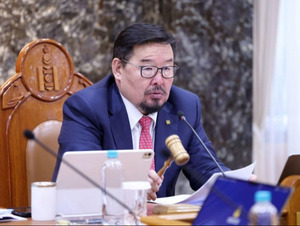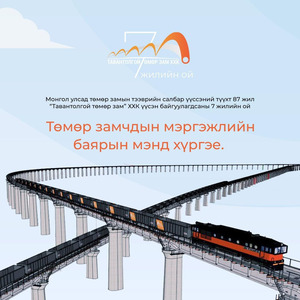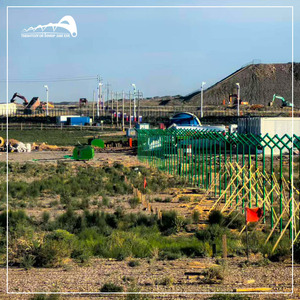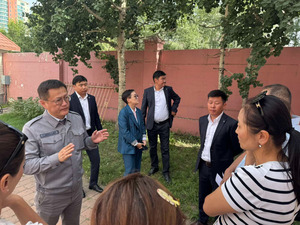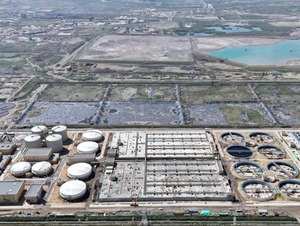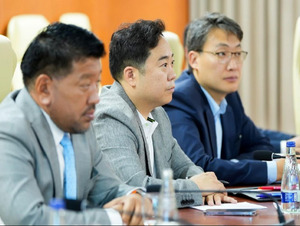ЗГ:Төрийн өмчит болон төрийн өмчийн оролцоотой 109 компанийг 87 болгоно
Н.Тавинбэх: ДЦС-3 дээр дахин дэлбэрэлт болоогүй
Чөлөөт бөхийн насанд хүрэгчдийн Дэлхийн аварга шалгаруулах тэмцээн есдүгээр сард болно
Ирэх оны төсвийн төсөлд олон нийтээс санал авах үйл явц үргэлжилж байна
УБЦТС: Өнөөдөр хийгдэх засварын хуваарь
ЦАГ АГААР: Улаанбаатарт өдөртөө 25 хэм дулаан
Энэ сард тэтгэвэр, тэтгэмж, хүүхдийн мөнгө олгох хуваарь
Гангийн эрсдэлийн үнэлгээнд тулгуурлан, өвөлжилтийн бэлтгэл ажлыг эртнээс хангаж ажиллахыг анхаарууллаа
ЗГ: Богд хааны ордон болон түүх, соёлын өвийг хамгаалах талаар үүрэг даалгавар өглөө
Нийслэл болон аймгийн сургууль, цэцэрлэгт 3324 багшийн сул орон тоо байна
Reform of legal framework for independence of judges
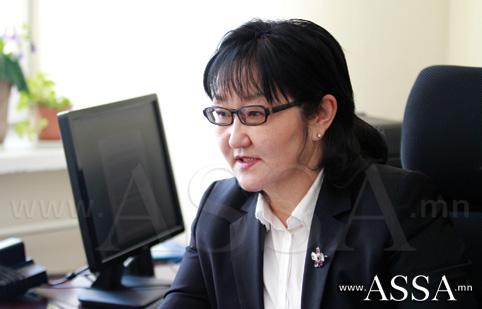
-Will you please brief us about the legal reform of the package law on courts?
-The constitution of Mongolia sets legal grounds for independence of the courts by defining the state power as legislative, executive and judicial. It has been 20 years after the Law on Courts was approved in 1993 in order to implement this concept. Since then, the court activities have been developed and upgraded but it can be said that the legal framework was insufficient to ensure independence and sovereignty of courts. The package law on courts entered into force on April 15, 2013, comprises of the Law on Courts, Law on Court administration, Law on Mediation, Law on Legal Status of Citizens’ Representatives and Law on Legal Status of Lawyers. Accordingly, the Law on Courts that was adopted with the purpose to implement the Constitution of Mongolia was upgraded into a package of laws which indicates the lack of regulations. These five laws will regulate different relations. However, the significance of this package law is that it regulates all relations related to judicial power at once.
-Are you of the view that this package law was necessary?
-It can be deemed that there was a necessity to implement activities aimed at ensuring independence of courts and judges. Concept, purpose and regulating relations of each law in this package law is specific and independent but these laws as one package became a set of regulations aimed at ensuring independence of courts and judges.
-Will you brief on specific regulations of these laws?
-With the Law on Courts, the organizational structure of courts has been changed. For example, trial court system is structured as district criminal and civil trial court, administrative trial court, soum and inter-soum court. With this change, trial court judges will be concentrated on criminal, civil and administrative cases. Appellate courts will be established separately for each type of court proceedings. It is prohibited for the Supreme Court judges to work under any of the criminal, civil and administrative court house and be involved in case proceedings of other court houses. As result of these changes judges will be qualified in specific types of cases and quality of court proceeding results will increase and the final beneficiaries will be parties to the cases.
-What is the reason for making the Law on Court Administration?
-This Law enables the court administration activities be independent for the first time. This is aimed at improving political, legal and economic security to ensure independence of courts and judges. This task will be performed by the Court General Council, its administration office and administration offices of all level courts. The Court General Council shall organize sets of activities to ensure independence of courts and judges and shall carry out all types of independent administrative activities aimed at selecting judges from lawyers and protecting legal rights and interests of judges. The duties of the Head of the Court General Council were performed by the Head of the Supreme Court before which was changed and for the first time, the Court General Council will operate independently and separately. It means the judges will work at the level of making decisions regarding cases and disputes while the administration of the court will be responsible for enabling all conditions for carrying out court proceedings such as purchasing furniture for the court rooms, ensuring social and economic security of judges.
-What is the concept of the Law on Legal Status of Judges?
-The Law made criteria and requirements for judges stricter and relations aimed at setting legal framework to ensure independence of judges and courts. It regulates political, economic and social security issues of judges from the appointment until retirement. In addition, it sets out evaluation on activities of the judges should be done every 3-5 years, prohibited items for judges, limitations on civil rights of judges, and the system of liabilities to be imposed for the persons who impact the independence of judges and courts.
-With enforcement of the Law on Legal Status of Citizens’ Representatives, one of the laws in the package, it is said that citizens now have the same right to resolve cases as judges.
-Citizens will participate in the court proceedings involving the crew with the same rights as the judges. The law makers deemed that this would become a proper leverage for establishing a system that ensures public monitoring on court proceedings.
-Lawyers are bringing up the topic of mediation a lot recently. Will you briefly explain what the importance of the Law on Mediation is?
-The Law on Mediation sets the legal grounds for starting to use mediation in settling legal disputes. Therefore, many positive results are anticipated such as the parties find a mutually acceptable solution, be satisfied with amicable resolution of their dispute and save time and money.
-Are there any criteria to evaluate performance of judges?
-The major evaluation criterion for performance of judges is legal and justified decision made by them. The judges must ensure they are immune to interference and are independent. This is closely related to have a good reputation among the public. Immunity of the judges to be independent will only be created after the judges ensure that the stakeholders can trust their fairness. On the other hand, the matter of court proceedings quality is also important. Before when an authorized official questioned professionalism and suitability of a judge, the Professional Committee used to issue a conclusion in this regard but now it is regulated so that the professional performance of judges is evaluated every 3-5 years. This can be interpreted as one form of increasing responsibility and strengthening requirements set for judges.
-What do you have to say about guarantee off independence of courts and judges?
-Only when the courts can operate independently the independence of judges will be guaranteed. Independence of courts and independence of judges can be studied separately but they are inseparable as they are two sides of a coin. Legal protection shall be deemed as the main guarantee that the judiciary power is executed independently and separately from legislative and executive power. Direct copy of Article 48.2 of the Constitution of Mongolia which states “The courts shall be financed from the State budget. The State shall ensure economic guarantee of the courts activities” into the Law on Courts was definitely insufficient. Regulations with more specific provisions on how the concepts of the Constitution should be implemented are required to fully ensure the economic security of the courts.
The package law on courts approved at initiation of the President of Mongolia entered into force three months ago. We interviewed L.Byambaa, Ph.D. in Law, State honored Lawyer, Head of Media and Public Relations at the Court General Council, with regard to this package law.

-Will you please brief us about the legal reform of the package law on courts?
-The constitution of Mongolia sets legal grounds for independence of the courts by defining the state power as legislative, executive and judicial. It has been 20 years after the Law on Courts was approved in 1993 in order to implement this concept. Since then, the court activities have been developed and upgraded but it can be said that the legal framework was insufficient to ensure independence and sovereignty of courts. The package law on courts entered into force on April 15, 2013, comprises of the Law on Courts, Law on Court administration, Law on Mediation, Law on Legal Status of Citizens’ Representatives and Law on Legal Status of Lawyers. Accordingly, the Law on Courts that was adopted with the purpose to implement the Constitution of Mongolia was upgraded into a package of laws which indicates the lack of regulations. These five laws will regulate different relations. However, the significance of this package law is that it regulates all relations related to judicial power at once.
-Are you of the view that this package law was necessary?
-It can be deemed that there was a necessity to implement activities aimed at ensuring independence of courts and judges. Concept, purpose and regulating relations of each law in this package law is specific and independent but these laws as one package became a set of regulations aimed at ensuring independence of courts and judges.
-Will you brief on specific regulations of these laws?
-With the Law on Courts, the organizational structure of courts has been changed. For example, trial court system is structured as district criminal and civil trial court, administrative trial court, soum and inter-soum court. With this change, trial court judges will be concentrated on criminal, civil and administrative cases. Appellate courts will be established separately for each type of court proceedings. It is prohibited for the Supreme Court judges to work under any of the criminal, civil and administrative court house and be involved in case proceedings of other court houses. As result of these changes judges will be qualified in specific types of cases and quality of court proceeding results will increase and the final beneficiaries will be parties to the cases.
-What is the reason for making the Law on Court Administration?
-This Law enables the court administration activities be independent for the first time. This is aimed at improving political, legal and economic security to ensure independence of courts and judges. This task will be performed by the Court General Council, its administration office and administration offices of all level courts. The Court General Council shall organize sets of activities to ensure independence of courts and judges and shall carry out all types of independent administrative activities aimed at selecting judges from lawyers and protecting legal rights and interests of judges. The duties of the Head of the Court General Council were performed by the Head of the Supreme Court before which was changed and for the first time, the Court General Council will operate independently and separately. It means the judges will work at the level of making decisions regarding cases and disputes while the administration of the court will be responsible for enabling all conditions for carrying out court proceedings such as purchasing furniture for the court rooms, ensuring social and economic security of judges.
-What is the concept of the Law on Legal Status of Judges?
-The Law made criteria and requirements for judges stricter and relations aimed at setting legal framework to ensure independence of judges and courts. It regulates political, economic and social security issues of judges from the appointment until retirement. In addition, it sets out evaluation on activities of the judges should be done every 3-5 years, prohibited items for judges, limitations on civil rights of judges, and the system of liabilities to be imposed for the persons who impact the independence of judges and courts.
-With enforcement of the Law on Legal Status of Citizens’ Representatives, one of the laws in the package, it is said that citizens now have the same right to resolve cases as judges.
-Citizens will participate in the court proceedings involving the crew with the same rights as the judges. The law makers deemed that this would become a proper leverage for establishing a system that ensures public monitoring on court proceedings.
-Lawyers are bringing up the topic of mediation a lot recently. Will you briefly explain what the importance of the Law on Mediation is?
-The Law on Mediation sets the legal grounds for starting to use mediation in settling legal disputes. Therefore, many positive results are anticipated such as the parties find a mutually acceptable solution, be satisfied with amicable resolution of their dispute and save time and money.
-Are there any criteria to evaluate performance of judges?
-The major evaluation criterion for performance of judges is legal and justified decision made by them. The judges must ensure they are immune to interference and are independent. This is closely related to have a good reputation among the public. Immunity of the judges to be independent will only be created after the judges ensure that the stakeholders can trust their fairness. On the other hand, the matter of court proceedings quality is also important. Before when an authorized official questioned professionalism and suitability of a judge, the Professional Committee used to issue a conclusion in this regard but now it is regulated so that the professional performance of judges is evaluated every 3-5 years. This can be interpreted as one form of increasing responsibility and strengthening requirements set for judges.
-What do you have to say about guarantee off independence of courts and judges?
-Only when the courts can operate independently the independence of judges will be guaranteed. Independence of courts and independence of judges can be studied separately but they are inseparable as they are two sides of a coin. Legal protection shall be deemed as the main guarantee that the judiciary power is executed independently and separately from legislative and executive power. Direct copy of Article 48.2 of the Constitution of Mongolia which states “The courts shall be financed from the State budget. The State shall ensure economic guarantee of the courts activities” into the Law on Courts was definitely insufficient. Regulations with more specific provisions on how the concepts of the Constitution should be implemented are required to fully ensure the economic security of the courts.
0 Сэтгэгдэл
